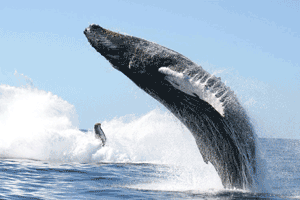Status
The conservation classification of animals is based on federal and state law as well as on international treaties. The conservation status of many species, or of a population of species, are reported on lists which indicate whether they need management for continued survival. These species are considered "listed". A species may be listed throughout all of its range or in a portion of its range.
Endangered Species Act
The Endangered Species Act (ESA) was passed by Congress in 1973. The ESA was enacted to conserve and protect threatened and endangered plants and animals. Under the ESA, the U.S. Fish and Wildlife Service is responsible for the protection of terrestrial and freshwater plants and animals and the National Marine Fisheries Service is responsible for the protection of marine plants and animals.
A plant or animal is listed as Endangered under the ESA if it is likely to become extinct in all or a portion of its range. A Threatened species is one that may become endangered in the future. There are many causes of a species to be listed as either Endangered or Threatened. A few of these reasons include loss of habitat, the introduction of exotic species that might prey upon or compete with the listed species, or natural causes like volcanic eruptions or earthquakes. Some of these reasons are caused by man through destroying or degrading habitat, or overharvesting. Endangered Species are protected by both state and federal laws. It is not legal to have in your possession any part of such an animal, living or dead, without special permission. Some Endangered Species are also listed in CITES (Convention on International Trade in Endangered Species of Wild Fauna and Flora).

Humpback whale breaching. Photo Credit: NOAA
A Rare species is a species that has a restricted range or is rare within a large area. These species can be at risk if their limited habitat is threatened or because there are so few of them.
Some species are listed as species of Special Concern because they are particularly susceptible to over-exploitation or environmental change. Many of these plants and animals are in areas that are experiencing rapid environmental change because of activities such as urbanization, changing land use, or dams. Plants and animals of Special Concern are usually covered by state laws.
Convention on International Trade in Endangered Species of Wild Fauna and Flora (CITES)
CITES is an international agreement to regulate the trade of plant and animal species between countries to help ensure the continued survival of those species. As of 2011, 175 countries had joined CITES. Each of these countries agrees to regulate trade of over 30,000 species that have been identified as needing protection.
International Whaling Commission (IWC)
The first major conservation effort to protect whales occurred with the signing of the International Convention for the Regulation of Whaling in 1946. The International Whaling Commission was created "to provide for the proper conservation of whale stocks and thus make possible the orderly development of the whaling industry". The International Whaling Commission created regulations worldwide to control the whaling industry of countries that had representatives sign the ICRW. This Commission was developed with hopes to conserve whale populations and ensure the future of the commercial whaling industry. The Commission created areas selected as sanctuaries, where no whaling should occur, made whaling of certain species off limits, set seasons and zones for whaling to occur, and set limits to the size and numbers of other species that could be harvested. Since 1946, whale populations had continued to decline and in response the IWC decreased the number of whales that could be harvested. In the 1960’s and 1970’s, the harvest of blue, humpback, fin, and sei whales were prohibited. A moratorium on all commercial whaling was started in 1986. After additional assessments of whale populations, the IWC also pronounced all Antarctic waters as a sanctuary in 1994, giving protection to all whales for the next 50 years.
Native people (aboriginals) in some areas of the world still depend on whaling and products for whales for survival (subsistence). The International Whaling Commission provided exceptions to commercial regulations for aboriginal people conducting subsistence whaling. The Commission set catch limits and species restrictions that are specific to the areas where aboriginal groups hunt whales.
Since the moratorium on international whaling in 1986, few countries have had documented whaling. These countries include Norway, USSR, Japan, and Iceland. Aboriginal subsistence whalers worldwide from 1985-2009 documented capturing 319 fin whales, 37 humpback whales, 3 sei whales, 2402 gray whales, 1244 minke whales, 1173 bowhead whales.
Marine Mammal Protection Act
The start of the environmental movement and concern over the depleted populations of marine mammals prompted the passing of the Marine Mammal Protection Act (MMPA; USC 16, Chapter 31) by Congress in 1972. Under this Act, all marine mammals are protected, and no "take" of marine mammals is allowed by U.S. citizens and in U.S. waters. This act also prohibits exportation, importation, and sale of marine mammals or marine mammal parts. "Take" in the Marine Mammal Protection Act is defined as attempted to or succeding "to hunt, harass, capture, or kill" any marine mammal. There are a few exceptions to this act that includes Alaska natives being allowed to hunt marine mammals for food and native crafts and allowing some incidental take in certain situations.
The National Marine Fisheries Service (NMFS) under the National Oceanic and Atmospheric Administration manages whales, dolphins, porpoises, seals and sea lions. The U.S. Fish and Wildlife Service, within the Department of the Interior, manages polar bears, sea otters, walrus, and manatees.
References
The International Whaling Commission. 2011. The Convention. Retrieved 15 December 2011. http://iwcoffice.org/commission/convention.htm.
U.S. Code Title 16 Conservation, Chapter 31 – Marine Mammal Protection. https://uscode.house.gov/view.xhtml?path=/prelim@title16/chapter31&edition=prelim.

 Marine Mammals of Georgia
Marine Mammals of Georgia